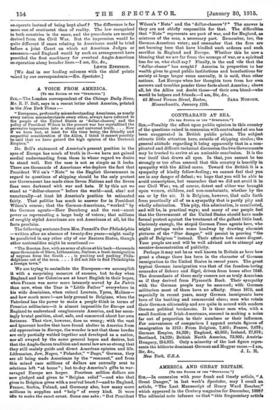CONTRABAND AT SEA.
[To Tar Eorroa or Tar .13rsomon...1 Sts.,—Possibly the effect upon public opinion in this country of the questions raised in connexion with contraband at sea bas been exaggerated in British public prints. The subject attracts little attention here, outside of shipping circles ; the general attitude regarding it being apparently that in a com- plicated and difficult technical discussion the two Governments may be trusted to arrive at an amicable conclusion, It is the war itself that draws all eyes. In that, you cannot be too strongly or too often assured that this country is heartily in sympathy with the Allied cause. Toward the British it is a sympathy of kindly fellow-feeling; we cannot feel that you are in any danger of defeat; we hope that you will be able to avoid conscription, but remember that we did not avoid it in our Civil War; we, of course, detest and abhor war brought upon women, children, and non-combatants, whether by the sea or by the air. It is Belgium, however, that calls forth from practically all of us a sympathy that is partly pity and wholly admiration. This pity, this admiration, is manifested, and will be, in practical ways ; and many of our people feel that the Government of the United States should have made formal protest against the treatment of the gallant little land. Curiously enough, the stupid German Press agents here, who might perhaps make some headway by drawing alarmist pictures of the " Slav danger," will persist in proving "the guilt of Belgium " instead. Their efforts but cause disgust. Your people are and will be well advised not to attempt any counter-demonstration of publicity.
Perhaps it may not be as well known in Britain as here how great a change there has been in the character of German immigration to the United States in recent years. The great typical German immigration was that of the freedom-loving comrades of Schurz and Sigel, driven from home after 1848. The descendants of these early comers are as truly American as if they derived from Plymouth Rock. Their sympathy with the German people may be assumed; with German militarism most of them have no affinity. Since 1870, and especially in recent years, many German immigrants have been of the banking and commercial class; men who retain their German citizenship and are quite in accord with modern German political tendencies. It is these men who, with a small fraction of Irish-Americans, succeed in making a noise far out of proportion to their numbers or their influence. For convenience of comparison I append certain figures of immigration in 1913: From Belgium, 7,405; France, 9,675; German Empire, 34,329; England, 43,363; Ireland, 27,876; Scotland, 14,220; British North America, 73,802; Austria.. Hungary, 254,825. Only a minority of the last figure repre- cents the hitherto dominant German and Magyar races.—I am,


















































 Previous page
Previous page